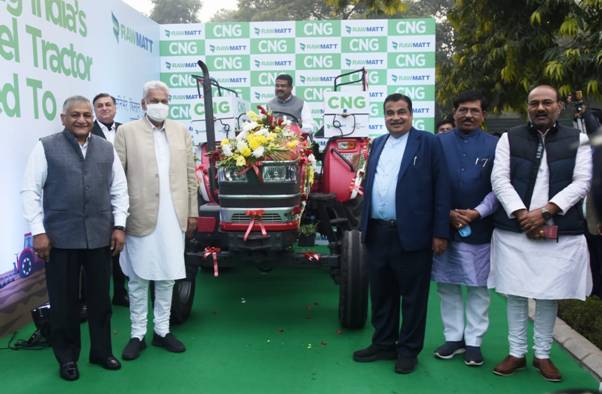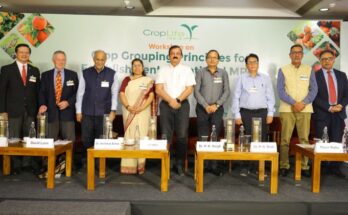Union Minister for Road Transport and Highways, Nitin Gadkari launched India’s first diesel tractor converted into CNG on Friday. Launching the CNG tractor, Gadkari said, the most important benefit for the farmer would be to save more than one lakh rupees annually on fuel costs, which would help them to improve their livelihood.
The minister said, since CNG is a clean fuel, it has the lowest content of carbon and other pollutants. It is economical as it has zero lead and is non-corrosive, non-dilutive and non-contaminating which helps in increasing the life of the engine and it requires less regular maintenance. It is cheaper as CNG prices are far more consistent than fluctuating petrol and diesel prices; also the average mileage of CNG vehicles is better than that of diesel and petrol driven vehicles. It is safer as CNG tanks come with a tight seal, which reduces the possibility of explosion while refuelling or in the event of a spill.
Gadkari said, it is also part of waste to wealth management, as stubble (parali) can be used as a raw material for producing Bio-CNG which will help the farmers to earn more. Replying to questions on when CNG-run tractors will be available in India, the minister said, the diesel-converted CNG tractor, done jointly by Rawmatt Techno Solutions and Tomasetto Achille India, is currently an experimental pilot project, and this would happen in due course.
Speaking on the occasion, Union Petroleum and Natural Gas Minister, Dharmendra Pradhan said that India was 3rd largest energy consumer in the world but per capita consumption was only one-third of the global average. He said that energy consumption was going to increase in the country and the renewable energy sources would play an important role in this. PNG and CNG supply would reach the 85-90 percent of the population in a few years. Pradhan said that an alternative energy model based on clean sources was developing, and this would help in meeting the country’s commitment to CoP21 for reduction in pollution.
He said that 5,000 compressed biogas (CBG) plants would be set up under the SATAT (Sustainable Alternative Towards Affordable Transportation) programme. There is an estimate that about 600 million metric tonnes of biomass from farms, forests and cities was available. Conversion of the waste to wealth would not only empower the farmers by providing additional income to them, but also help in reducing pollution, improving health outcomes and making the cities clean. He assured that a decision would be taken soon for allowing the retail outlets to sell the CBG. The minister said that 8.5 percent ethanol blending in petrol had been achieved and soon India would be number one country in ethanol blending.





Excellent